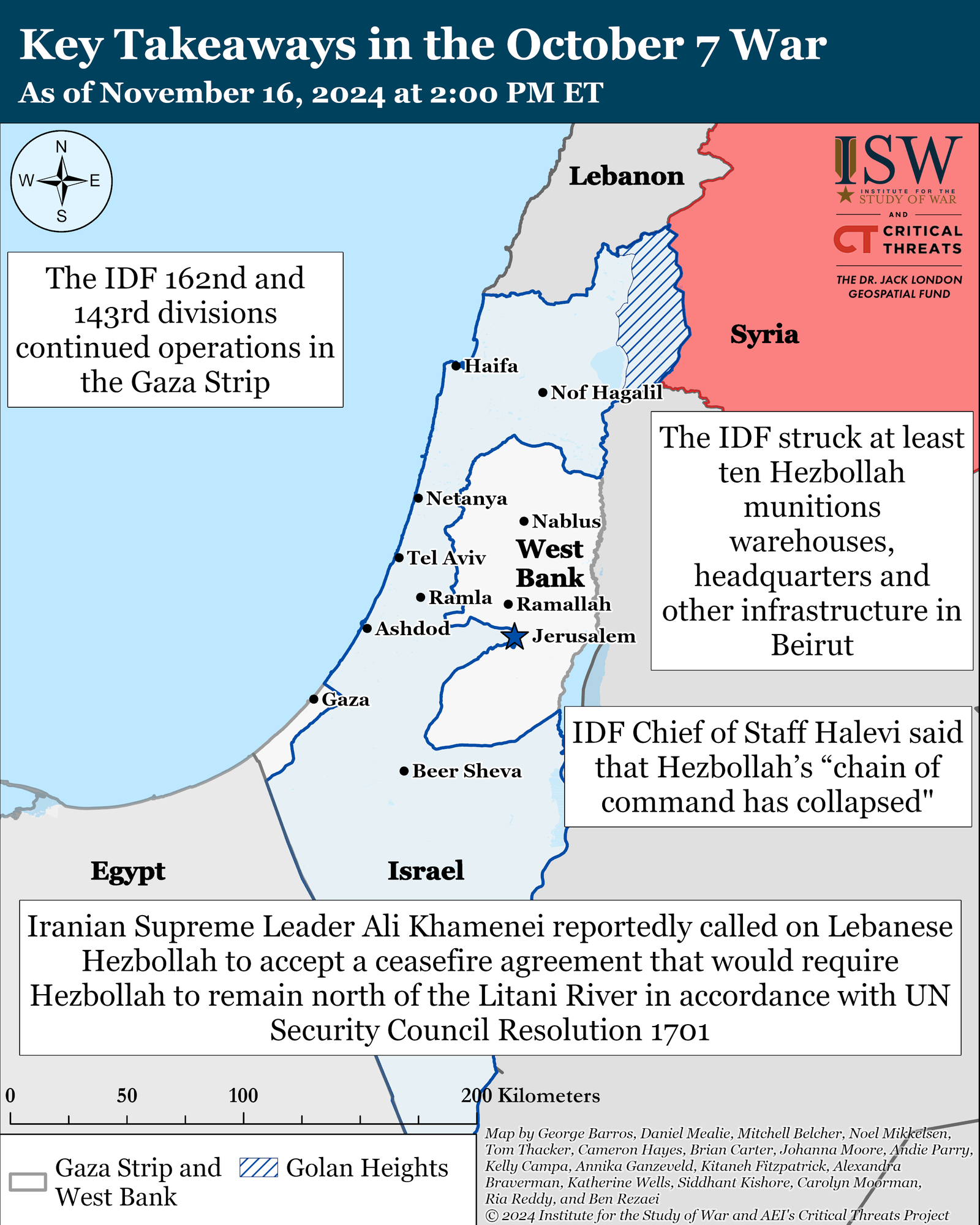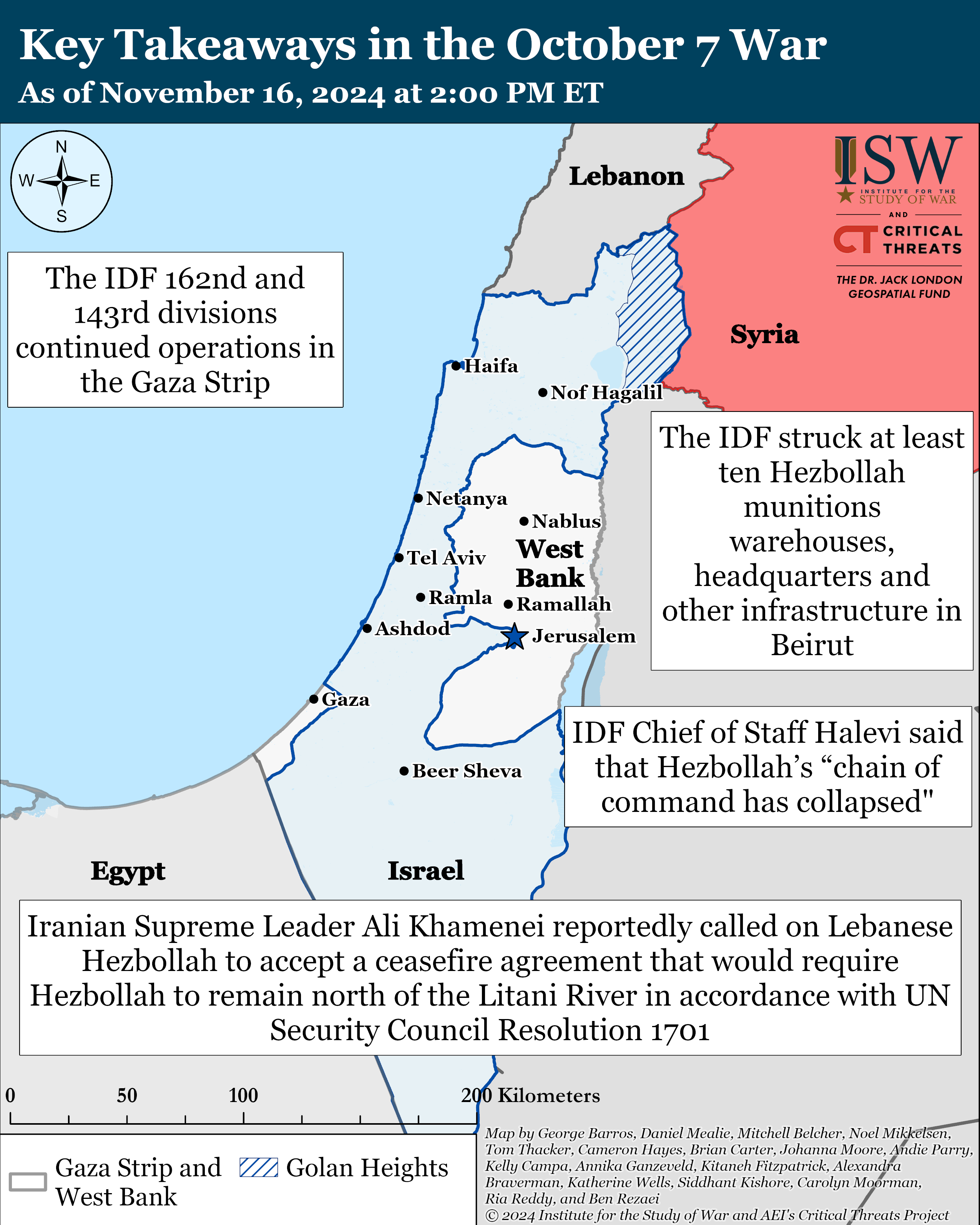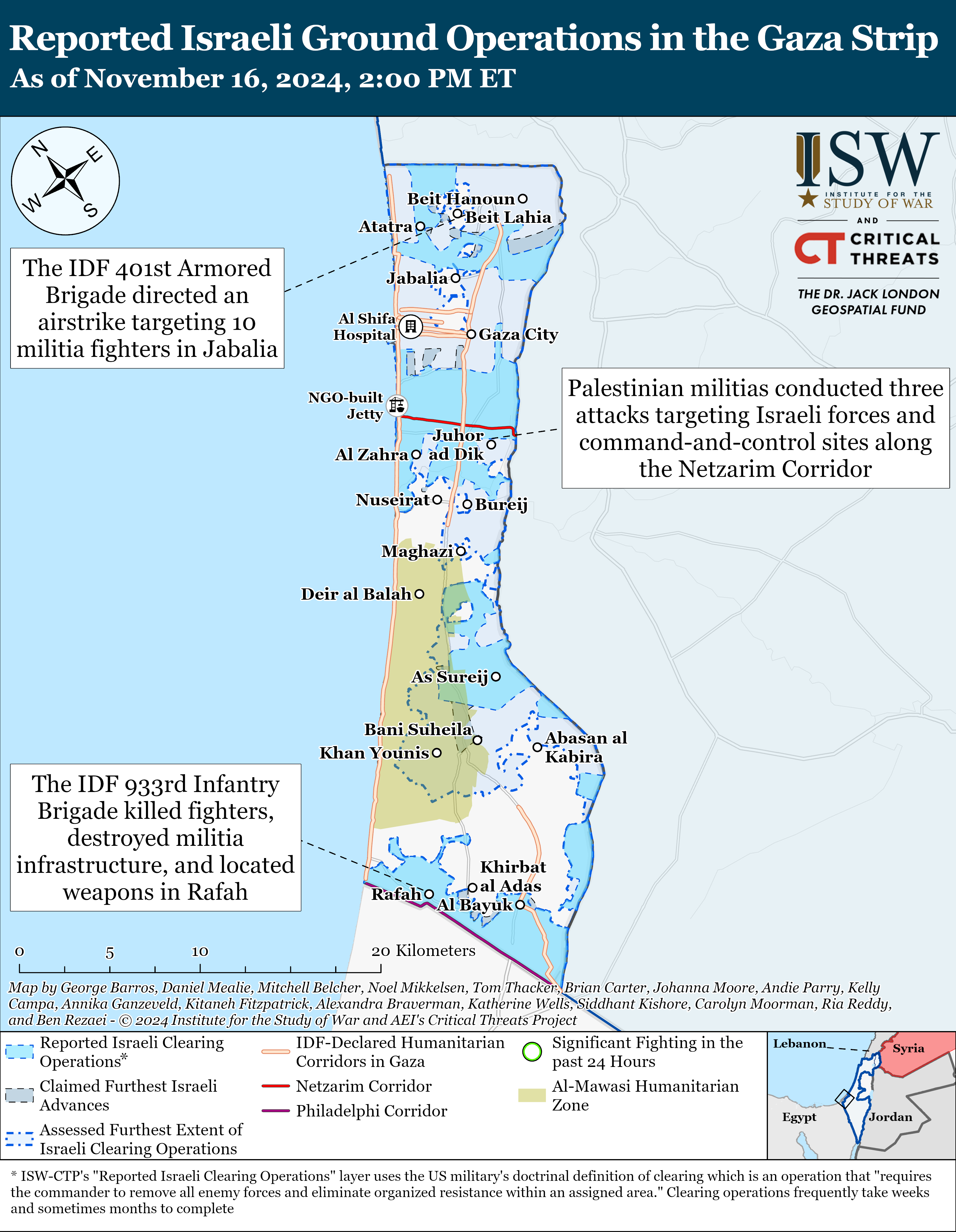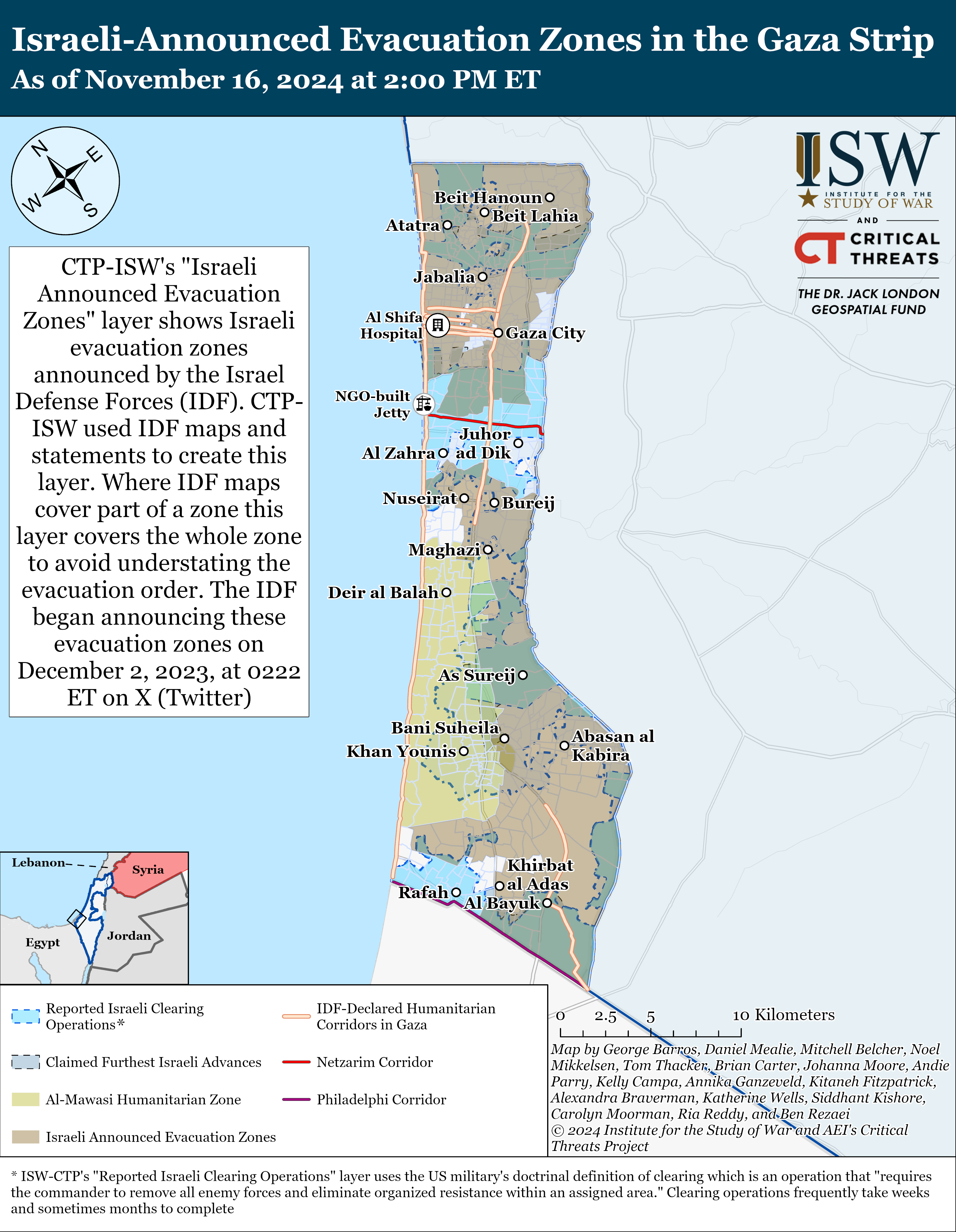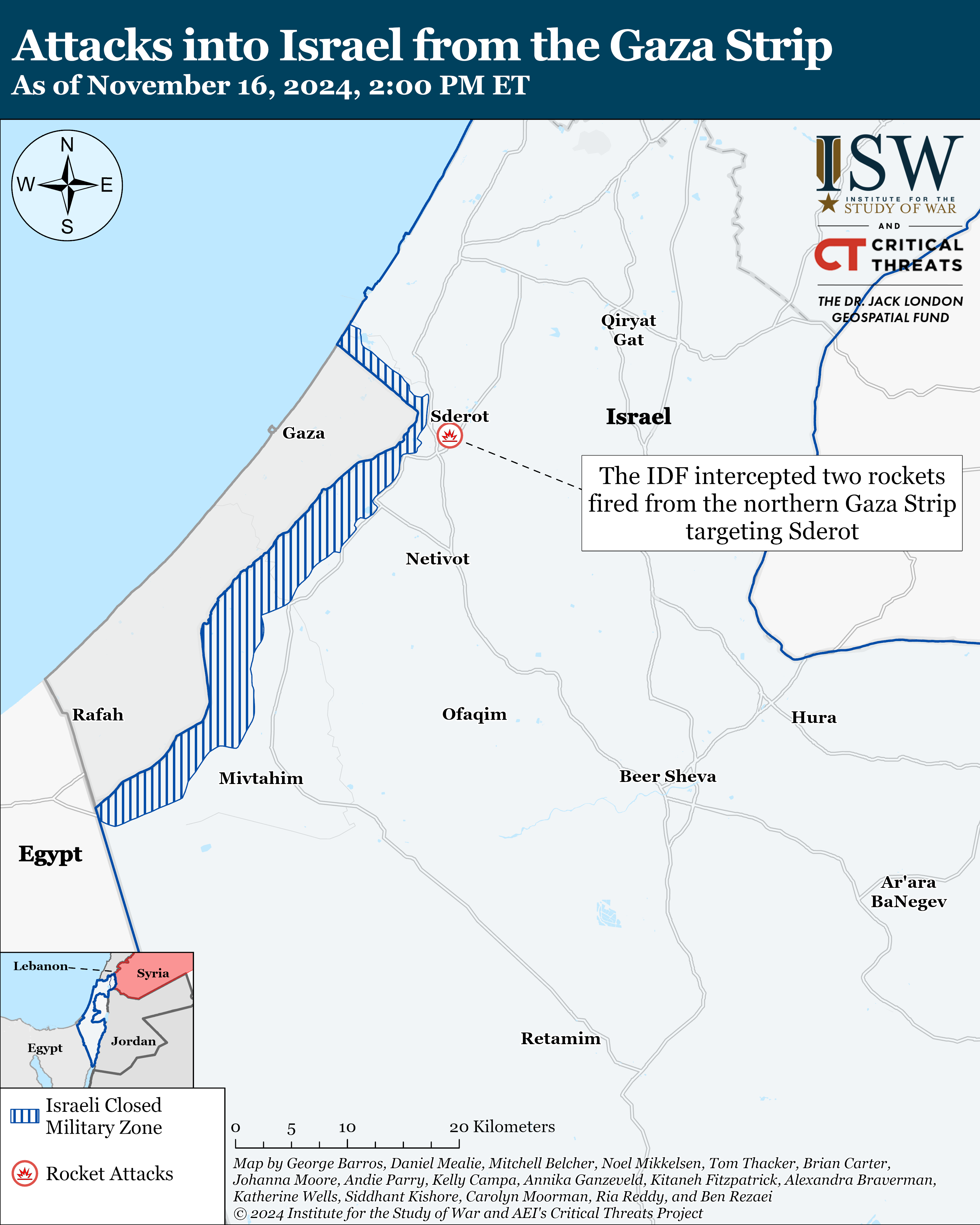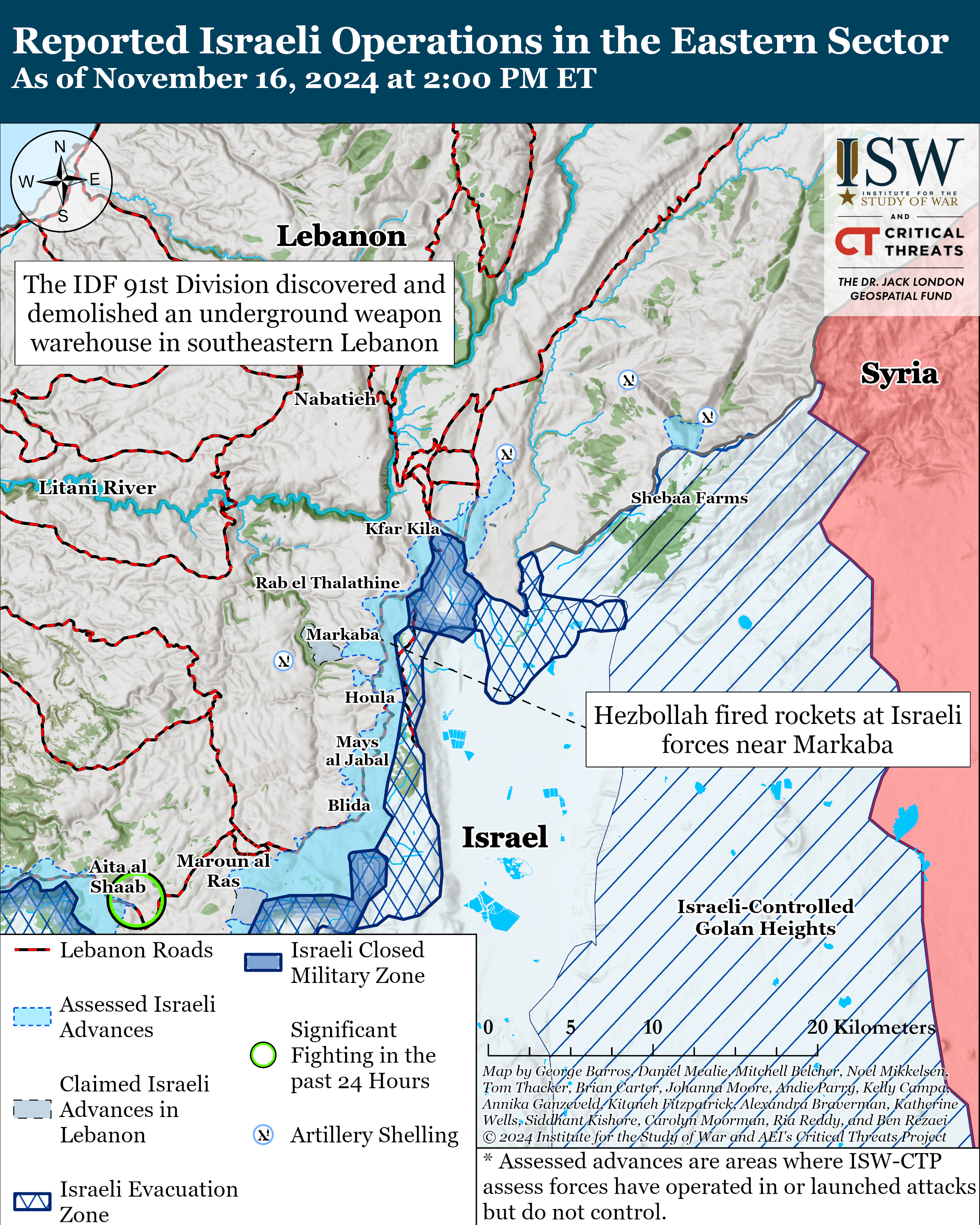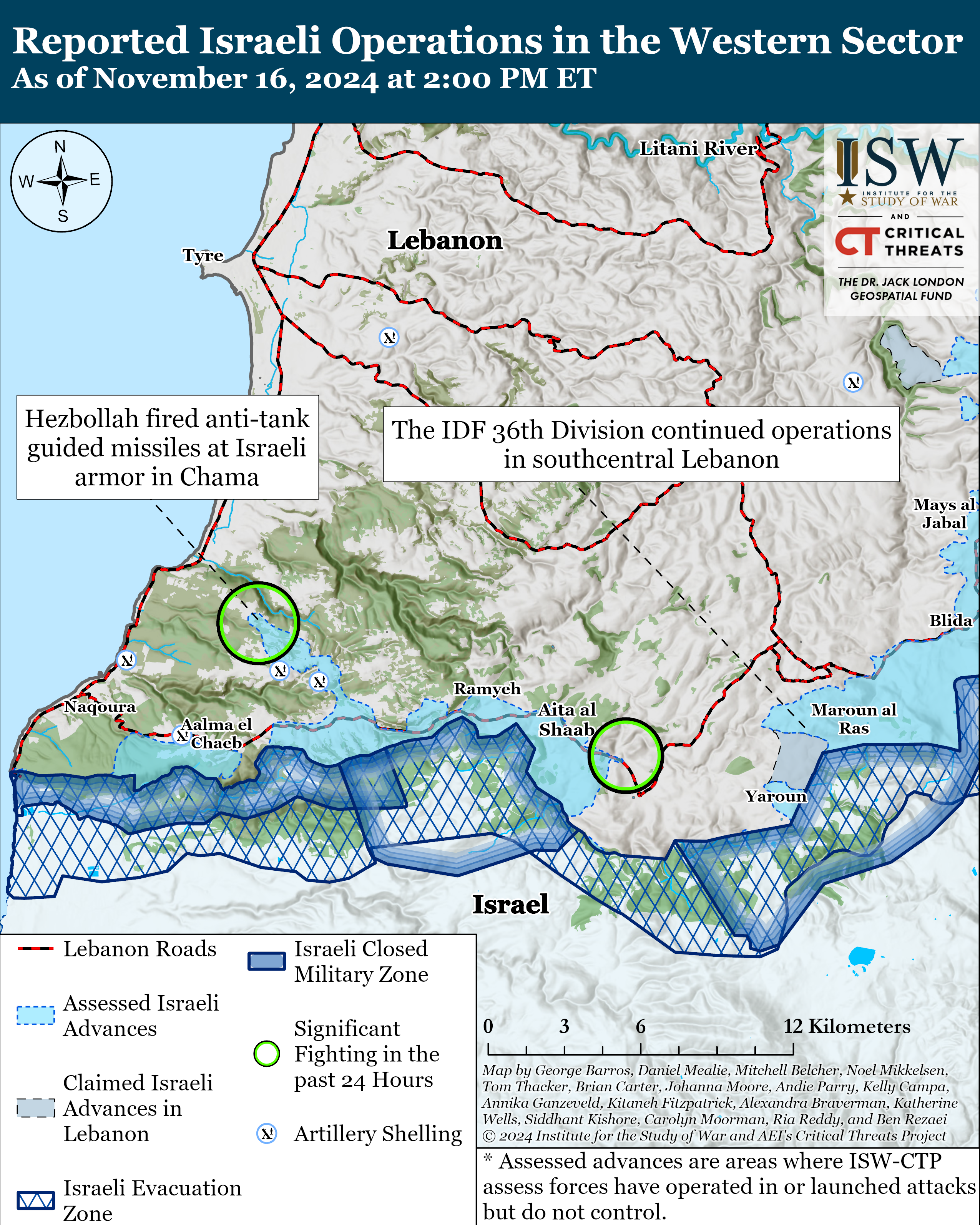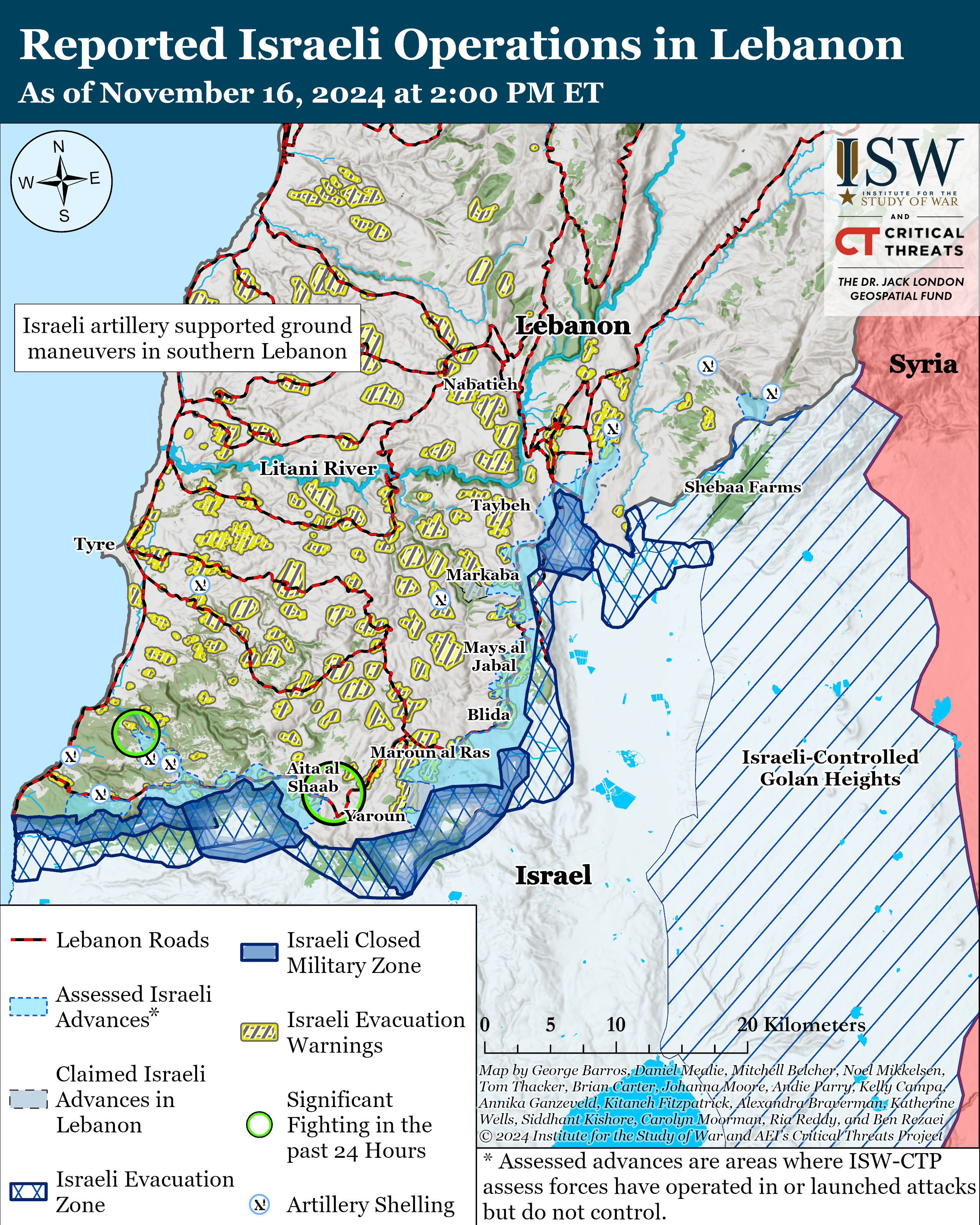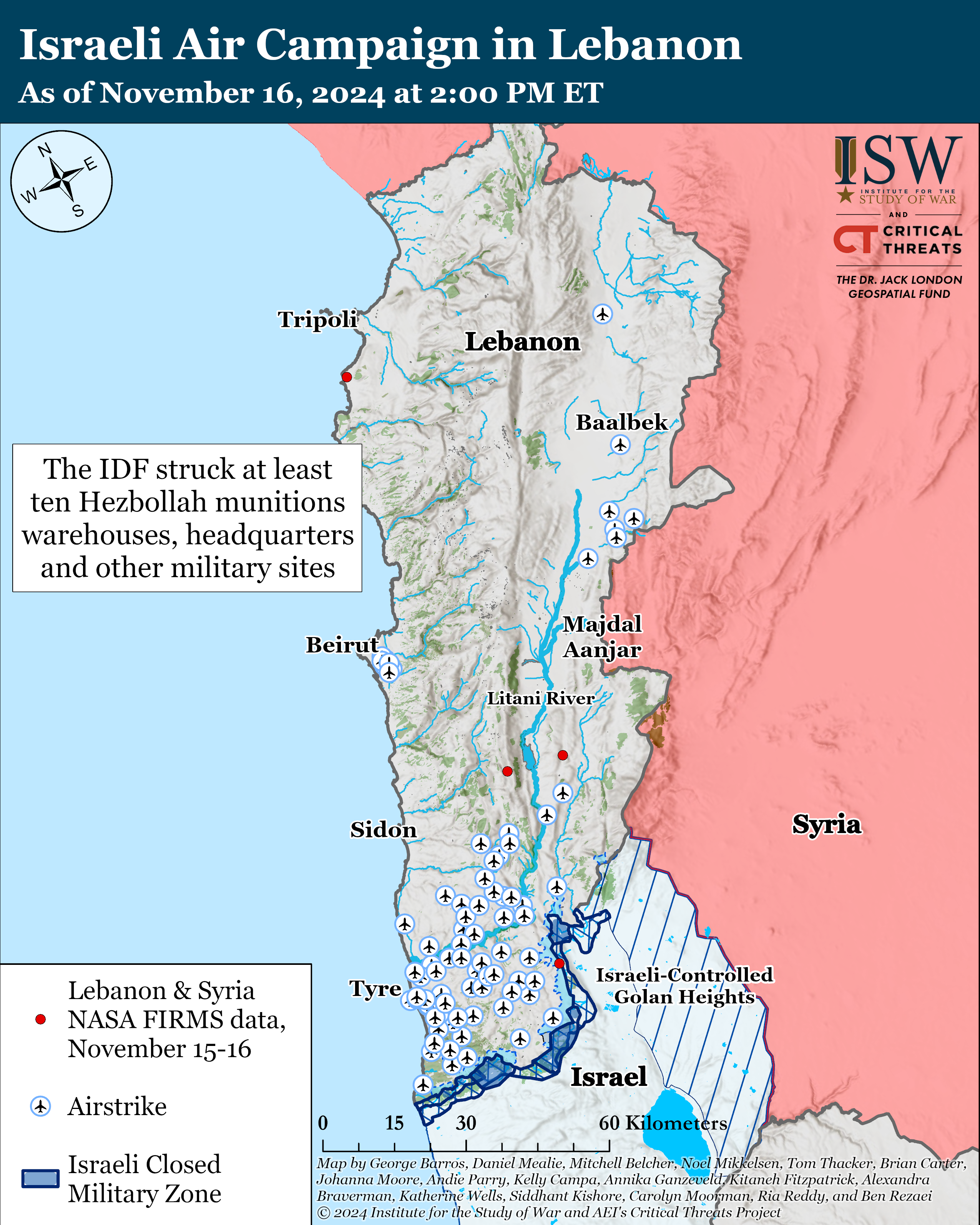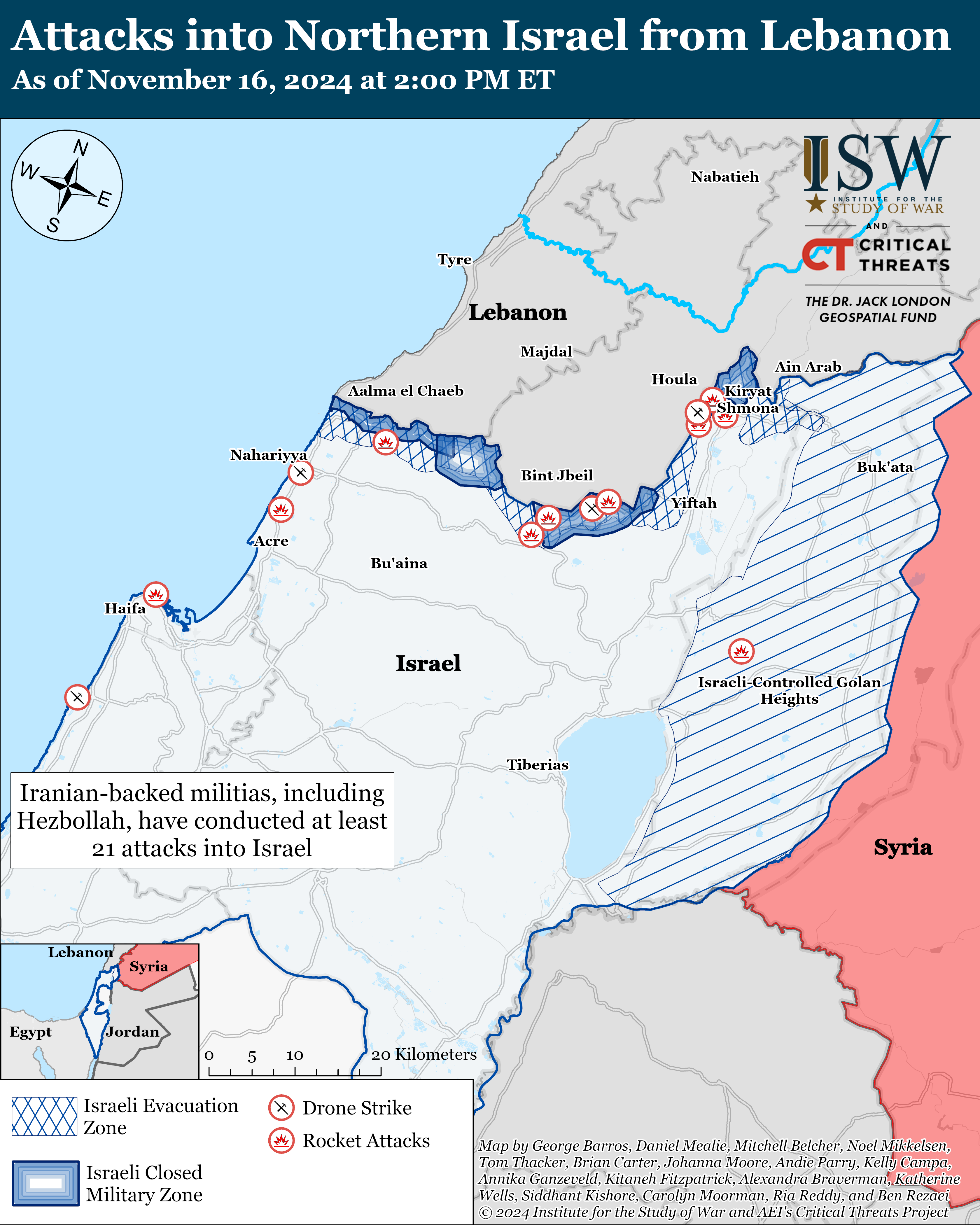Information Cutoff: 2:00 pm ET
The Critical Threats Project (CTP) at the American Enterprise Institute and the Institute for the Study of War (ISW) publish the Iran Update, which provides insights into Iranian and Iranian-sponsored activities that undermine regional stability and threaten US forces and interests. Click here to see CTP and ISW’s interactive map of Israeli ground operations. This map is updated daily alongside the static maps present in this report.
We do not report in detail on war crimes because these activities are well-covered in Western media and do not directly affect the military operations we are assessing and forecasting. We utterly condemn violations of the laws of armed conflict and the Geneva Conventions and crimes against humanity even though we do not describe them in these reports.
Iranian Supreme Leader Ali Khamenei reportedly called on Lebanese Hezbollah to accept a ceasefire agreement that would require Hezbollah to remain north of the Litani River per UN Security Council Resolution 1701.[i] Two individuals affiliated with the Islamic Revolutionary Guards Corps (IRGC) told the New York Times on November 16 that senior Supreme Leader adviser Ali Larijani conveyed this message to Hezbollah during his recent visit to Beirut.[ii] The message emphasized that Khamenei supports “ending the war with Israel” and that Iran will help Hezbollah recover from the war.[iii] It is in Iran’s interest to end the fighting between Israel and Hezbollah to prevent Israel from further weakening Hezbollah.[iv] Iran could also calculate that it could help rearm and reconstitute Hezbollah in southern Lebanon after a ceasefire takes effect. Iran has historically transferred weapons to Hezbollah in Lebanon via Syria, which means that preventing this rearmament and reconstitution process would require some form of interdiction effort against Iran.[v] This report, assuming it is accurate, highlights the extent to which Iran lacks the capability or willingness to defend the Axis of Resistance against Israel. Iran failed to prevent Israel from defeating or severely degrading Hamas units across the Gaza Strip, and it now similarly appears opposed to helping Hezbollah fight Israel.[vi]
Key Takeaways:
- Iran Encourages Hezbollah to Accept Ceasefire: Iranian Supreme Leader Ali Khamenei reportedly called on Lebanese Hezbollah to accept a ceasefire agreement that would require Hezbollah to remain north of the Litani River per UN Security Council Resolution 1701.
- Israeli Ground Operations in Lebanon: IDF Chief of Staff Lieutenant General Herzi Halevi reaffirmed that the IDF would continue to degrade Hezbollah and that Hezbollah’s “chain of command has collapsed.”
- Iranian Nuclear Program: A hardline Iranian parliamentarian called for acquiring a nuclear weapon to restore Iranian deterrence with Israel.
- Houthi Attack Campaign: US Undersecretary for Defense for Acquisition and Sustainment Bill LaPlante said on November 14 that the Houthis’ missile and technology production is comparable to that of advanced countries.
Gaza Strip:
Axis of Resistance objectives:
- Erode the will of the Israeli political establishment and public to sustain clearing operations in the Gaza Strip
- Reestablish Hamas as the governing authority in the Gaza Strip
The IDF 162nd Division continued clearing operations in Beit Lahia and Jabalia in the northern Gaza Strip on November 16. Israeli forces killed multiple fighters, destroyed militia infrastructure, and located large quantities of weapons and IEDs.[vii] Israeli forces directed an airstrike targeting 10 militia fighters in Jabalia that posed a threat to Israeli forces.[viii]
Palestinian militias conducted two rocket attacks targeting an Israeli command-and-control site along the Netzarim Corridor on November 16.[ix] Hamas also fired small arms targeting Israeli soldiers along the Corridor.[x]
The IDF 143rd Division continued operations in Rafah in the southern Gaza Strip on November 16. The 933rd Infantry Brigade killed multiple fighters, destroyed militia infrastructure, and located large quantities of weapons and IEDs.[xi]
The IDF intercepted two rockets launched from the northern Gaza Strip targeting Sderot on November 16.[xii]
Axis of Resistance objectives:
- Establish the West Bank as a viable front against Israel
Nothing significant to report.
Northern Israel and Lebanon
Lebanese Hezbollah objectives:
- End Israeli operations in the Gaza Strip
- Survive the October 7 War as a capable political and military organization with control over Lebanon
IDF Chief of Staff Lieutenant General Herzi Halevi reaffirmed that the IDF would continue to degrade Hezbollah and that Hezbollah’s “chain of command has collapsed.”[xiii] Halevi said on November 16 that as long as Hezbollah continued to shoot at northern Israel, “we will continue to fight, we will continue to carry out plans, go further, attack in depth, hurt Hezbollah.”[xiv] The chief of staff made these comments on a visit to Kfar Kila where the IDF 91st Division operated in late October to clear Hezbollah infrastructure.[xv] The 91st Division has now expanded clearing operations to towns deeper into Lebanon.[xvi]
The 91st Division discovered and demolished an underground weapons warehouse on November 16.[xvii] The 7th Armored Brigade (91st Division) located crates of explosives, ammunition, grenades, and a mobile rocket launcher inside the warehouse.[xviii] Hezbollah claimed rocket attacks targeting Israeli forces operating in the southern and eastern Markaba.[xix] Hezbollah claimed seven rocket attacks targeting Israeli forces operating in eastern Tallousseh, west of Markaba on November 15.[xx]
The IDF 36th Division continued operations in southcentral Lebanon on November 16.[xxi] Hezbollah has continued rocket attacks targeting Israeli forces attempting to advance from east and south of Maroun al Ras into “second line” Lebanese border towns.[xxii] Hezbollah attacked Israeli forces south of Hanin with one-way attack drones.[xxiii] Lebanese media reported Israeli artillery shelling in Ain Ebal, a ”second line” town. [xxiv]
Hezbollah-affiliated sources reported that Israeli forces continued to operate in the town of Chama, approximately five kilometers into southwestern Lebanon. Israeli forces advanced to Chama on November 15.[xxv] A Hezbollah-affiliated journalist reported that Israeli forces “renewed” their incursion toward the outskirts of Chama under extensive artillery fire.[xxvi] Hezbollah attacked an Israeli tank with an anti-tank guided missile (ATGM) on the eastern outskirts of Chama on November 16.[xxvii] Hezbollah claimed that the ATGM ignited the tank, killing and injuring the crew.[xxviii] Hezbollah did not provide any evidence to substantiate these claims and has repeatedly lied about the success of its forces since this campaign began. Lebanese media reported Israeli artillery shelling in Tayr Harfa, Jebbayn, and Alma al Chaab south of Chama.[xxix]
A dud Israeli artillery shell struck UNIFIL headquarters in Chama, southwest Lebanon on November 15.[xxx] UNIFIL said that the shell did not detonate, and bomb disposal experts were able to secure the area and conduct a controlled detonation.[xxxi] The shell did not injure the peacekeepers and caused minimal structural damage.[xxxii] Israeli forces advanced into Chama on November 15.[xxxiii]
The IDF has continued its air campaign targeting Hezbollah weapons manufacturing and storage sites in Beirut since CTP-ISW’s data cutoff on November 15. The IDF struck at least ten Hezbollah munitions warehouses, headquarters, and other military sites.[xxxiv] The IDF Arabic-language spokesperson issued warnings to residents of southern Beirut neighborhoods before striking these areas.[xxxv]
The IDF Air Force strike targeting PIJ headquarters in Damascus on November 14 killed 2 PIJ officials.[xxxvi] The strikes targeted two buildings in Damascus’ Mezzeh and Qudsaya neighborhoods and caused “significant damage” to PIJ’s headquarters and fighting ability, according to the IDF.[xxxvii] A Syrian analyst reported that the strikes killed PIJ Political Bureau member Abdul Aziz Saeed al Minawi and PIJ foreign relations official Yousef Abu Issa. [xxxviii] The strike also killed multiple PIJ fighters. The Syrian Defense Ministry reported that the strike killed 15 people and injured 16.[xxxix] The IDF said that PIJ is a key part of Iranian efforts to support Hezbollah against Israel.[xl]
This map illustrates individual Israeli air and artillery strikes based on local Lebanese reporting. This map depicts strikes reported from 2:00pm ET on November 15 to 2:00pm ET on November 16. This map is not exhaustive. CTP-ISW cannot independently verify the locations of Israeli strikes.
Iranian-backed actors, including Hezbollah, have conducted at least 21 attacks into Israel since CTP-ISW’s last data cutoff on November 15.[xli] Hezbollah claimed 17 of the 21 attacks.[xlii] Hezbollah claimed three separate rocket and drone attacks targeting Israeli military facilities in Haifa and Acre.[xliii] Hezbollah also claimed one rocket attack targeting Yara base, in the Western Galilee.[xliv]
Iran and the Axis of Resistance
The Islamic Resistance in Iraq—a coalition of Iranian-backed Iraqi militias—has claimed five attacks targeting Israel since CTP-ISW’s last data cutoff on November 15. The claims include the following:
- Two drone attacks targeting unspecified “vital target[s]” in Eilat.[xlv]
- A drone attack targeting an unspecified military target in northern Israel.[xlvi]
- Two drone attacks targeting unspecified military targets in southern Israel.[xlvii]
The IDF Air Force intercepted two drones launched from Iraq over the Red Sea on November 16.[xlviii] The drones did not enter Israeli airspace. The IDF reported that another drone launched “from the east” crashed before entering Israeli airspace on November 16.[xlix]
A hardline Iranian parliamentarian called for acquiring a nuclear weapon to restore Iranian deterrence with Israel. Ahmad Naderi claimed on November 16 that a nuclear weapon is necessary to “establish balance” in the Middle East.[l] Naderi similarly claimed on November 9 that possessing a nuclear weapon would create “maximum deterrence.”[li] These statements implicitly acknowledge that the Iranian drone and missile attacks on Israel in April and October 2024 failed to restore deterrence with Israel and that additional drone and missile attacks will similarly fail to restore deterrence. Naderi’s statements also come amid numerous indications that Iran has very likely restarted its nuclear weapons research program.[lii]
US Undersecretary for Defense for Acquisition and Sustainment Bill LaPlante said on November 14 that the Houthis’ missile and technology production is comparable to that of advanced countries.[liii] LaPlante added that Houthi production is at “some degree of scale” during an Axios panel. LaPlante also highlighted the threat of Houthis targeting naval forces with ballistic missiles.
A ballistic missile launched from Yemen set off alerts in Eilat in southern Israel on November 16.[liv] The Houthis have not claimed a ballistic missile attack targeting Israel at the time of this writing.
The Iran Update provides insights into Iranian and Iranian-sponsored activities abroad that undermine regional stability and threaten US forces and interests. It also covers events and trends that affect the stability and decision-making of the Iranian regime. The Critical Threats Project (CTP) at the American Enterprise Institute and the Institute for the Study of War (ISW) provides these updates regularly based on regional events.
CTP-ISW defines the “Axis of Resistance” as the unconventional alliance that Iran has cultivated in the Middle East since the Islamic Republic came to power in 1979. This transnational coalition is comprised of state, semi-state, and non-state actors that cooperate to secure their collective interests. Tehran considers itself to be both part of the alliance and its leader. Iran furnishes these groups with varying levels of financial, military, and political support in exchange for some degree of influence or control over their actions. Some are traditional proxies that are highly responsive to Iranian direction, while others are partners over which Iran exerts more limited influence. Members of the Axis of Resistance are united by their grand strategic objectives, which include eroding and eventually expelling American influence from the Middle East, destroying the Israeli state, or both. Pursuing these objectives and supporting the Axis of Resistance to those ends have become cornerstones of Iranian regional strategy.
View Citations
